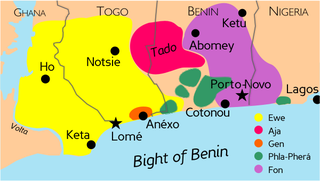
Back Ewe (taal) AF ईवे भाषा ANP لغة الإيوي Arabic لغه الايوى (لغه) ARZ Idioma ewé AST اوه دیلی AZB ইউই ভাষা Bengali/Bangla Eweeg BR Ewe Catalan Эве (мотт) CE
This article includes a list of general references, but it lacks sufficient corresponding inline citations. (January 2010) |
| Ewe | |
|---|---|
| Eʋegbe | |
| Native to | Ghana, Togo, Benin |
| Region | Southern Ghana east of the Volta River |
| Ethnicity | 3.9 million Ewe in Ghana (2021 census)[1] |
Native speakers | 5.0 million (2013–2019)[1] |
| Latin (Ewe alphabet) Ewe Braille | |
| Language codes | |
| ISO 639-1 | ee |
| ISO 639-2 | ewe |
| ISO 639-3 | Variously:ewe – Ewewci – Wacikef – Kpesi |
| Glottolog | ewee1241 Ewekpes1238 Kpessiwaci1239 Waci Gbe |
| ELP | Kpessi |
 Gbe languages. Ewe is in yellow. | |
| Person | Eʋe |
|---|---|
| People | Eʋeawó |
| Language | Eʋegbě |
| Country | Eʋenyígbá |
Ewe (Eʋe or Eʋegbe [ɛβɛɡ͡bɛ])[2] is a language spoken by approximately 5 million people in West Africa, mainly in Ghana and Togo.[1] Ewe is part of a group of related languages commonly called the Gbe languages. The other major Gbe language is Fon, which is mainly spoken in Benin. Like many African languages, Ewe is tonal as well as a possible member of the Niger-Congo family.
The German Africanist Diedrich Hermann Westermann published many dictionaries and grammars of Ewe and several other Gbe languages. Other linguists who have worked on Ewe and closely related languages include Gilbert Ansre (tone, syntax), Herbert Stahlke (morphology, tone), Nick Clements (tone, syntax), Roberto Pazzi (anthropology, lexicography), Felix K. Ameka (semantics, cognitive linguistics), Alan Stewart Duthie (semantics, phonetics), Hounkpati B. Capo (phonology, phonetics), Enoch Aboh (syntax), and Chris Collins (syntax).
- ^ a b c Ewe at Ethnologue (27th ed., 2024)

Waci at Ethnologue (27th ed., 2024)
Kpesi at Ethnologue (27th ed., 2024)
- ^ Warburton, Irene; Kpotufe, Prosper; Glover, Roland Kori; Schneeberg, Nan (1968). Ewe Baisc Course (Revised ed.). Bloomington, Indiana: African Studies Program, Indiana University. p. 243.